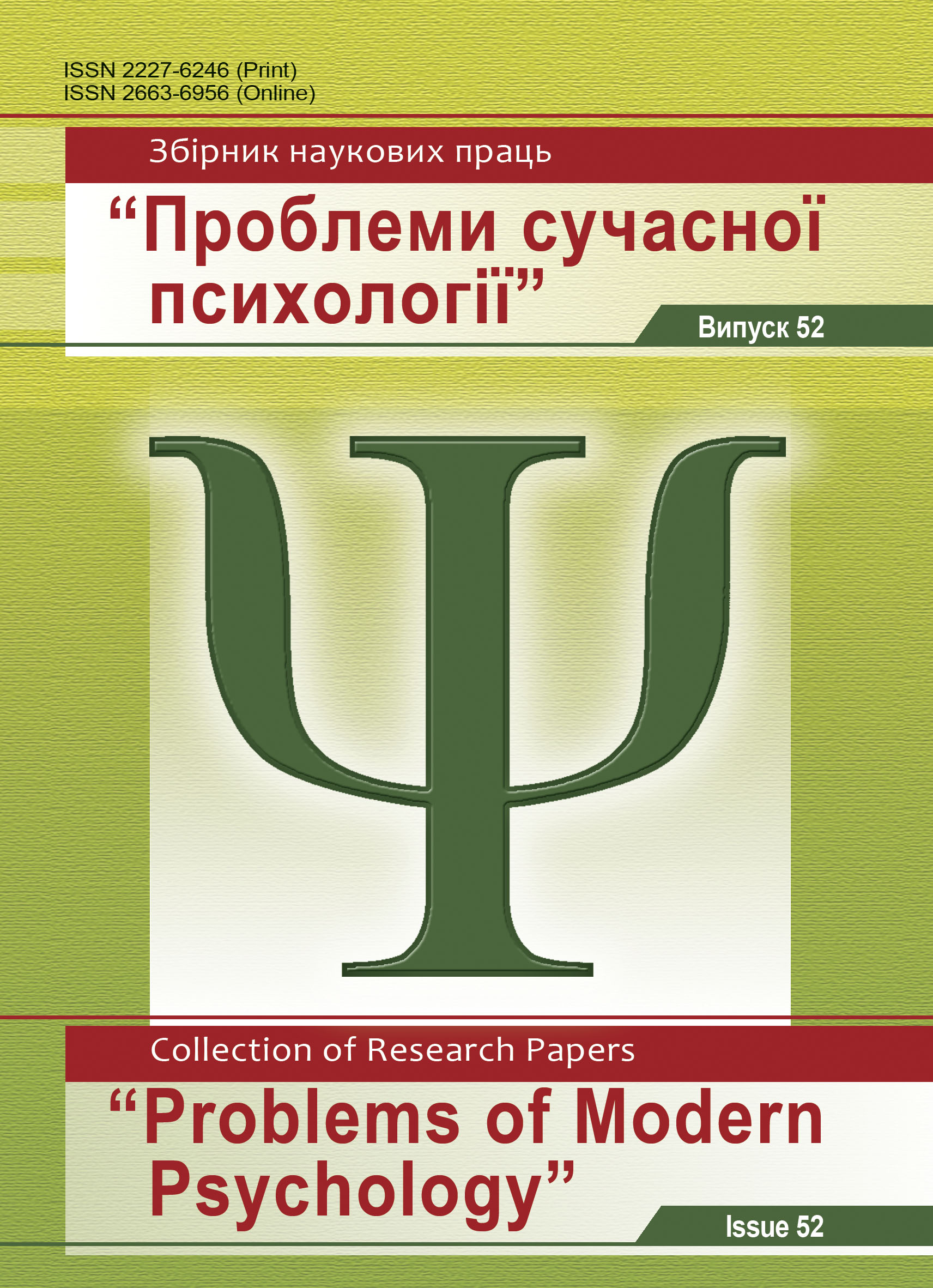Сучасні підходи до проблеми розвитку пізнавальної діяльності учнів за способами управління груповою діяльністю
DOI:
https://doi.org/10.32626/2227-6246.2021-52.61-83Ключові слова:
пізнавальна діяльність учнів, пізнавальна проблема, спільна діяльність учнів, ефективність розв’язання проблемного завдання, мислення учнів, досвід творчої діяльностіАнотація
Метою статті є опис сучасних підходів до проблеми розвитку пізнавальної діяльності учнів за способами управління груповою діяльністю, а також дослідження ефективності групових форм діяльності на уроках, що значною мірою визначається рівнем активності мислення учнів.
Для розв’язання поставлених у роботі завдань використано такі теоретичні методи дослідження: категоріальний, структурно-функціональний, аналіз, систематизація, моделювання, узагальнення. Також у статті використано емпіричні методи, такі як експеримент, із метою дослідження ефективності групових форм роботи школярів на уроках.
Результати дослідження. Доведено, що результативність членів початкових груп в індивідуальному розв’язанні задач впливала на успішність спільної роботи школярів. Ці дані дали підстави зробити висновок, що для спільної діяльності школярів під час групової роботи характерні специфічні чинники, що, не зважаючи на рівноцінний склад мікрогруп учнів, призводять до різної ефективності роботи в цих групах, яка, своєю чергою, залежить від ефективності розв’язання проблемної задачі кожним учасником спілкування окремо. Ці чинники необхідно враховувати вчителям на уроках для підвищення рівня знань школярів із навчальних предметів та удосконалення прийомів роботи з учнями в межах здійснення індивідуального підходу до кожного окремого школяра.
Висновки. Визначено, що ефективність групових форм роботи на уроках у закладах середньої освіти великою мірою визначається рівнем активності мислення школярів, що, своєю чергою, залежатиме від декількох умов: чи отримають учні знання готовими, тобто вчитель повністю пояснює нову тему (але не переказує літературний твір, супроводжуючи переказ єдиним «правильним» поясненням та оцінюванням матеріалу, що іноді трапляється в педагогічній практиці вчителів); чи прагне вчитель шляхом навідних запитань включити у процес вивчення матеріалу самих учнів; чи вивчення нового матеріалу здійснюється у процесі самостійної пошукової діяльності учнів, які, опинившись перед проблемною ситуацією, самі шукають із неї вихід, розв’язуючи таким чином пізнавальну задачу.
Доведено, що співробітництво учнів сприяє кращому розумінню і запам’ятовуванню змісту прочитаного, активізації контрольної функції. Трактуючи роль групових форм роботи в навчальному процесі, ми наголошуємо, що дослідження ефективності цієї роботи показує її значні переваги, і до цих пір не було випадку, щоб у нашому експерименті було зафіксовано меншу продуктивність групової роботи, ніж індивідуальної чи спільної.
Показано, що для повноцінного засвоєння навчального матеріалу необхідні всі названі вище шляхи. Але для того, щоб учні засвоювали не тільки систему знань, умінь, навичок, але й досвід творчої роботи, необхідно включати їх у процес мисленнєвої діяльності, залучати до розв’язування проблемних задач, які забезпечували б творче застосування школярами набутих знань і вмінь у практичній діяльності та розвиток особистості учня.
Посилання
Honcharuk, Nataliia, & Onufriieva, Liana (2018). Psykholohichnyi analiz rivniv pobudovy komunikatyvnykh dii [Psychological analysis of levels of communicative actions’ constructing]. Psykholinhvistyka. Psikholingvistika. Psycholinguistics: Zb. nauk. prats DVNZ «Pereiaslav-Khmelnytskyi ped. un-t imeni Hryhoriia Skovorody – Psycholinguistics. Psycholinguistics. Psycholinguistics: Collection of Scientific Papers of Pereiaslav-Khmelnytskyi Pedagogical University named after Hryhorii Skovoroda, 24 (1), 97–117. Pereiaslav-Khmelnytskyi : FOP Dombrovska Ya. M. https://doi.org/10.31470/2309-1797-2018-24-1-97-117 [in Ukrainian].
Allright, D., & Bailey, K. M. (1999). Focus on the Language Classroom. Cambridge : Cambridge Univ. Press.
Bachman, T. F. (1991). Fundamental Consideration in Language Testing. Oxford : Oxford Univ. Press.
Benson, P. (2001). Teaching and Researching Autonomy in Language Learning. Harlow : Longman.
Dafei, D. (2007). An Exploration of the Relationship Between Learner Autonomy and English Proficiency. Retrieved on September 27. Retrieved from https://asian-efl-journal.com/pta_Nov_07_dd.pdf
Hořínek, M. (2007). A closer look at learner autonomy – a qualitative study. Diploma thesis. Retrieved on August 2. Retrieved from https://is.muni.cz/th/12319/ff_m/thesis.pdf
Mykhalchuk, Nataliia, & Ivashkevych, Eduard (2018). Psycholinguistic features of the development of social intelligence of the teacher. Psykholinhvistyka. Psikholingvistika. Psycholinguistics: Zb. nauk. prats DVNZ «Pereiaslav-Khmelnytskyi ped. un-t imeni Hryhoriia Skovorody» – Psycholinguistics. Psycholinguistics. Psycholinguistics: Collection of Scientific Papers of Pereiaslav-Khmelnytskyi Pedagogical University named after Hrygorii Skovoroda, 23 (1), 242–257. Pereiaslav-Khmelnytskyi : FOP Dombrovska Ya. M. Retrieved from https://doi.org/10.5281/zenodo.1211618 (ISSN 2415-3397, Index Copernicus, Web of Science).
Mykhalchuk, Nataliia, & Kryshevych, Olga (2019). The peculiarities of the perception and understanding of Sonnets written by W. Shakespeare by the students of the Faculty of Foreign Languages. Psykholinhvistyka. Psikholingvistika. Psycholinguistics: Zbirnyk naukovykh prats. Seriia: Psykholohiia – Psycholinguistics. Psycholinguistics. Psycholinguistics: Collection of scientific issues. Series: Psychology, 26 (1), 265–285. Pereiaslav-Khmelnytskyi : FOP Dombrovska Ya. M. https://doi.org/10.31470/2309-1797-2019-26-1-265-285 [in English].
Nunan, D. (2003). Nine steps to learner autonomy. Retrieved on June 20. Retrieved from http://www.andrasprak.su.se/polopoly_fs/1.84007.1333707257!/menu/standard/file/2003_11_Nunan_eng.pdf
Tarone, E. (1983). Some Thoughts on the Notion of Communicative Strategy. TESOL Quarterly, 15, 285–295.
##submission.downloads##
Опубліковано
Як цитувати
Номер
Розділ
Ліцензія
Авторське право (c) 2021 Едуард Івашкевич, Ліана Онуфрієва

Ця робота ліцензується відповідно до Creative Commons Attribution-NonCommercial 4.0 International License.
Редакція має повне право публікувати у Збірнику оригінальні наукові статті як результати теоретичних і експериментальних досліджень, які не знаходяться на розгляді для опублікування в інших виданнях. Автор передає редколегії Збірника права на розповсюдження електронної версії статті, а також електронної версії англомовного перекладу статті (для статей українською та російською мовою) через будь-які електронні засоби (розміщення на офіційному web-сайті Збірника, в електронних базах даних, репозитаріях та ін).
Автор публікації зберігає за собою право без узгодження з редколегією та засновниками використовувати матеріали статті: а) частково чи повністю в освітніх цілях; б) для написання власних дисертацій; в) для підготовки абстрактів, доповідей конференцій та презентацій.
Автор публікації має право розміщувати електронні копії статті (у тому числі кінцеву електронну версію, завантажену з офіційного web-сайту Збірника) на:
- персональних web-ресурсах усіх Авторів (web-сайти, web-сторінки, блоги тощо);
- web-ресурсах установ, де працюють Автори (включно з електронними інституційними репозитаріями);
- некомерційних web-ресурсах відкритого доступу (наприклад, arXiv.org).
Але в усіх випадках обов’язковою є наявність бібліографічного посилання на статтю або гіперпосилання на її електронну копію, що містяться на офіційному сайті Збірника.






